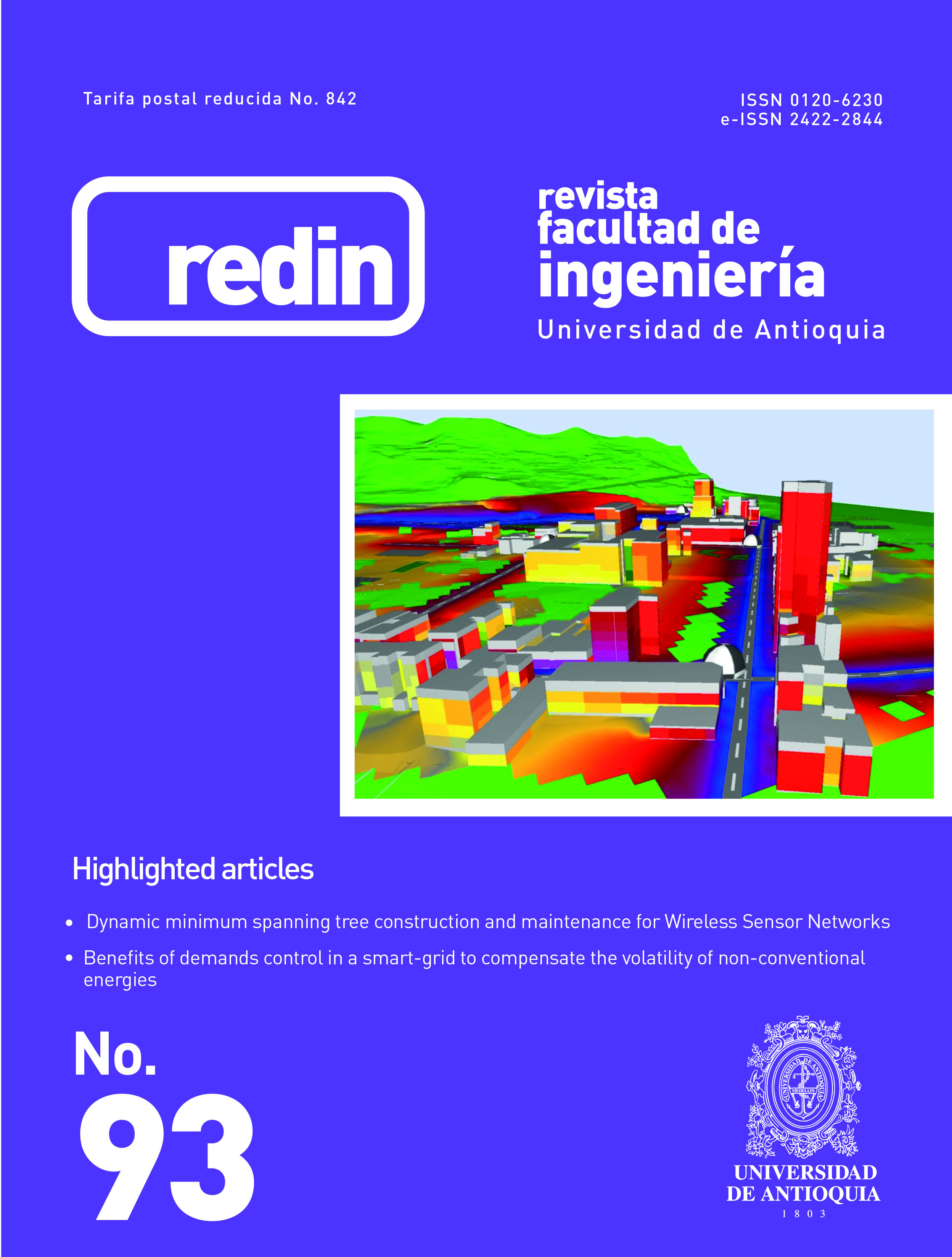Benefits of demands control in a smart-grid to compensate the volatility of non-conventional energies
DOI:
https://doi.org/10.17533/udea.redin.20190404Keywords:
wind-power, smart-cities, short-term dispatchAbstract
Uruguay is a leader in the usage of renewable energies, getting 96% of its electricity from an assorted assemble of such sources with an increasing percentage of non-conventional energies, of wind power mostly. As clean and financially stable as they are, non-conventional energies have weaknesses. Unlike thermic and most hydro-sources, wind and solar energies are not controllable,are intermittent and uncertain some hours ahead, complicating the short-term operation and maintenance of electrical systems. This work explores how to use smart-grids capabilities to adjust electricity demand as a hedge against novel short-position risks in the Uruguayan electricity market coming from the volatility of non-conventional renewables. This approach uses combinatorial optimization dispatch models to quantitatively assess benefits resulting from having demand control. Results show that for the Uruguayan context, the benefits are not only due to savings in production costs (generation). Smart-grid optimal dispatch-schedules are also less stressing regarding the operation of the grid itself.
Downloads
References
C. Risso, “Using smart-grids capabilities as a natural hedge against novel risks coming from non-conventional renewable electricity generation,” in Ibero-American Congress on Information Management and Big Data , Soria, Spain, 2018.
REN21,“Renewables2018globalstatusreport,”REN21Community, Paris, France, Tech. Rep., 2018.
R. Karki and R. Billinton, “Cost-effective wind energy utilization for reliable power supply,” IEEE Transactions on Energy Conversion , vol. 19, no. 2, pp. 435–440, Jun. 2004.
J. M. Morales, A. J. Conejo, H. Madsen, P. Pinson, and M. Zugno, Integrating Renewables in Electricity Markets ,1sted. NewYork,USA: Springer US, 2014.
M. Joosa and I. Staffell, “Short-term integration costs of variable renewable energy: Wind curtailment and balancing in britain and germany,” Renewable and Sustainable Energy Reviews , vol. 86, pp. 45–65, Apr. 2018.
N. Li, L. Chen, and S. H. Low, “Optimal demand response based on utility maximization in power networks,” in 2011 IEEE Power and Energy Society General Meeting , Jul. 2011, pp. 1–8.
A. Mohsenian-Rad and A. Leon-Garcia, “Optimal residential load control with price prediction in real-time electricity pricing environments,” IEEE Transactions on Smart Grid , vol. 1, no. 2, pp. 120–133, Sep. 2010.
F. Paganini, P. Belzarena, and P. Monzón, “Decision making in forward power markets with supply and demand uncertainty,” in 2014 48 th Annual Conference on Information Sciences and Systems (CISS) , Mar. 2014, pp. 1–6.
W. Jeon, A. J. Lamadrid, J. Y. Mo, and T. D. Mount, “Using deferrable demand in a smart grid to reduce the cost of electricity for customers,” Journal of Regulatory Economics , vol. 47, no. 3, pp. 239–272, Jun. 2015.
J. Y. Mo and W. Jeon, “How does energy storage increase the efficiency of an electricity market with integrated wind and solar power generation?—A case study of Korea,” Sustainability , vol. 8, no. 10, 2017.
L. Jiang and S. Low, “Multi-period optimal energy procurement and demand response in smart grid with uncertain supply,” in 2011 50 th IEEE Conference on Decision and Control and European Control Conference , Dec. 2011, pp. 4348–4353.
I.Atzeni,L.G.Ordóñez,G.Scutari,D.P.Palomar,andJ.R.Fonollosa, “Demand-side management via distributed energy generation and storage optimization,” IEEE Transactions on Smart Grid , vol. 4, no. 2, pp. 866–876, Jun. 2013.
Y. Wu, V. K. N. Lau, D. H. K. Tsang, L. P. Qian, and L. Meng, “Optimal energy scheduling for residential smart grid with centralized renewable energy source,” IEEE Systems Journal , vol. 8, no. 2, pp. 562–576, Jun. 2014.
S. Montes de Oca, P. Belzarena, and P. Monzón, “Optimal demand response based on time-correlated utility in forward power markets,” in 2015 IEEE PES Innovative Smart Grid Technologies Latin America (ISGT LATAM) , Oct. 2015, pp. 597–602.
C. Risso and G. Guerberoff. (2018, May. 10) Nonparametric optimization of short-term confidence bands for wind power generation. [Online]. Available: https://arxiv.org/abs/1805.04474v1
S. de Mello, G. Cazes, and A. Gutierrez, “Operational wind energy forecast with power assimilation,” 14 th International Conference on Wind Engineering, Porto Alegre, Brazil, 2015.
Published
How to Cite
Issue
Section
License
Copyright (c) 2019 Revista Facultad de Ingeniería Universidad de Antioquia

This work is licensed under a Creative Commons Attribution-NonCommercial-ShareAlike 4.0 International License.
Revista Facultad de Ingeniería, Universidad de Antioquia is licensed under the Creative Commons Attribution BY-NC-SA 4.0 license. https://creativecommons.org/licenses/by-nc-sa/4.0/deed.en
You are free to:
Share — copy and redistribute the material in any medium or format
Adapt — remix, transform, and build upon the material
Under the following terms:
Attribution — You must give appropriate credit, provide a link to the license, and indicate if changes were made. You may do so in any reasonable manner, but not in any way that suggests the licensor endorses you or your use.
NonCommercial — You may not use the material for commercial purposes.
ShareAlike — If you remix, transform, or build upon the material, you must distribute your contributions under the same license as the original.
The material published in the journal can be distributed, copied and exhibited by third parties if the respective credits are given to the journal. No commercial benefit can be obtained and derivative works must be under the same license terms as the original work.










 Twitter
Twitter